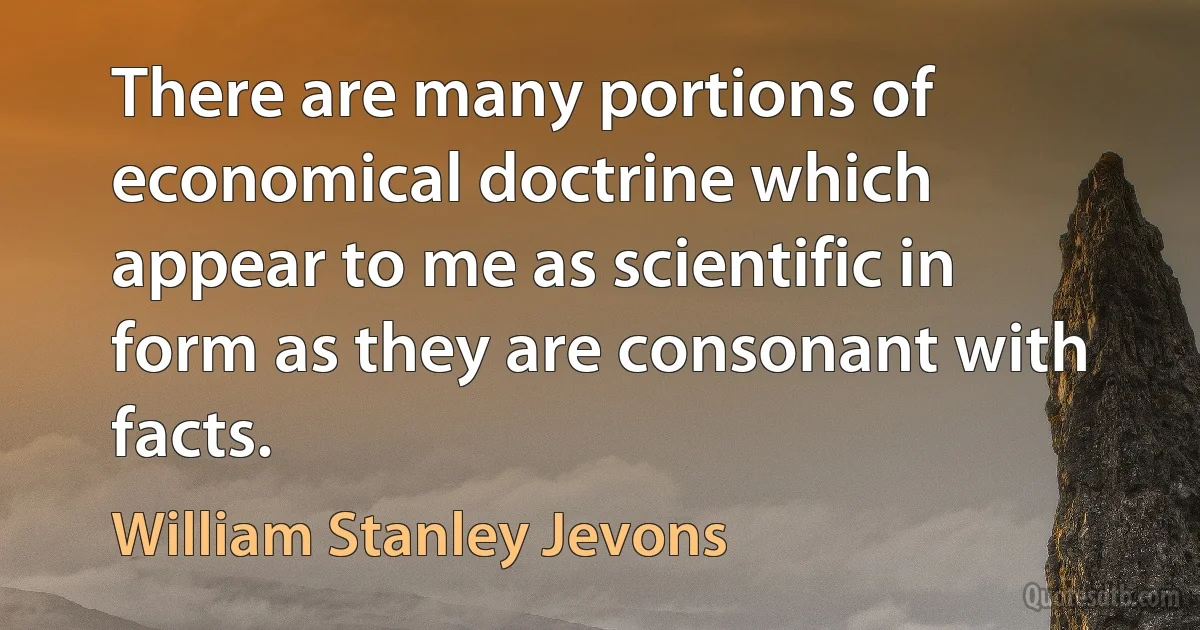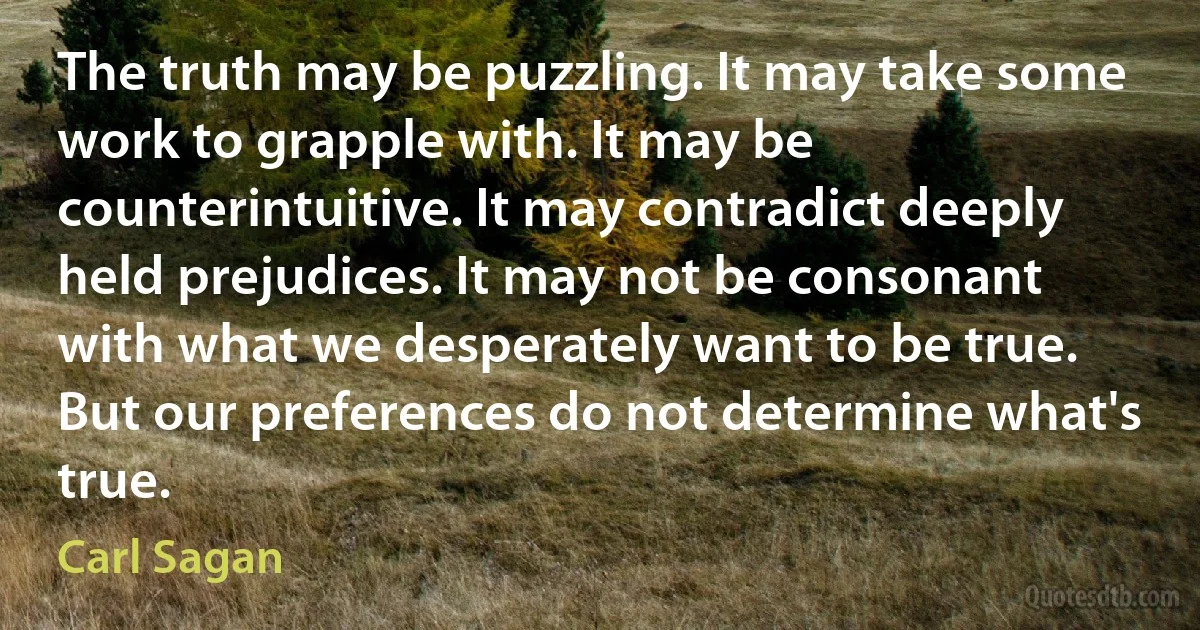Consonant Quotes
As the people are the only legitimate fountain of power, and it is from them that the constitutional charter, under which the several branches of government hold their power, is derived, it seems strictly consonant to the republican theory, to recur to the same original authority, not only whenever it may be necessary to enlarge, diminish, or new-model the powers of the government, but also whenever any one of the departments may commit encroachments on the chartered authorities of the others.

James Madison
The creation and destruction of harmonic and 'statistical' tensions is essential to the maintenance of compositional drama. Any composition (or improvisation) which remains consonant and 'regular' throughout is, for me, equivalent to watching a movie with only 'good guys' in it, or eating cottage cheese.

Frank Zappa
That kind of skeptical, questioning, "don't accept what authority tells you" attitude of science - is also nearly identical to the attitude of mind necessary for a functioning democracy. Science and democracy have very consonant values and approaches, and I don't think you can have one without the other.

Carl Sagan
[The career a young man should choose should be] one that is most consonant with our dignity, one that is based on ideas of whose truth we are wholly convinced, one that offers us largest scope in working for humanity and approaching that general goal towards which each profession offers only one of the means: the goal of perfection ... If he works only for himself he can become a famous scholar, a great sage, an excellent imaginative writer [Dichter], but never a perfected, a truly great man.

Karl Marx
For if we may compare infinities, it would seem to require a greater infinity of power to cause the causes of effects, than to cause the effects themselves. This idea is analogous to the improving excellence observable in every part of the creation; such as in the progressive increase of the solid or habitable parts of the earth from water; and in the progressive increase of the wisdom and happiness of its inhabitants; and is consonant to the idea of our present situation being a state of probation, which by our exertion we may improve, and are consequently responsible for our actions.

Erasmus Darwin
They [mathematicians] only take those things into consideration, of which they have clear and distinct ideas, designating them by proper, adequate, and invariable names, and premising only a few axioms which are most noted and certain to investigate their affections and draw conclusions from them, and agreeably laying down a very few hypotheses, such as are in the highest degree consonant with reason and not to be denied by anyone in his right mind. In like manner they assign generations or causes easy to be understood and readily admitted by all, they preserve a most accurate order, every proposition immediately following from what is supposed and proved before, and reject all things howsoever specious and probable which can not be inferred and deduced after the same manner.-Barrow, Isaac.

Isaac Barrow
Writings are naturally accessible to all who can read. Therefore a philosopher who chose the second way could expound only such opinions as were suitable for the nonphilosophic majority: all of his writings would have to be, strictly speaking, exoteric. These opinions would not be in all respects consonant with truth. Being a philosopher, that is, hating "the lie in the soul" more than anything else, he would not deceive himself about the fact that such opinions are merely "likely tales," or "noble lies," or "probable opinions," and would leave it to his philosophic readers to disentangle the truth from its poetic or dialectic presentation. But he would defeat his purpose if he indicated clearly which of his statements expressed a noble lie, and which the still more noble truth.

Leo Strauss
Propaganda in favor of action that is consonant with enlightened self-interest appeals to reason by means of logical arguments based upon the best available evidence fully and honestly set forth. Propaganda in favor of action dictated by the impulses that are below self-interest offers false, garbled or incomplete evidence, avoids logical argument and seeks to influence its victims by the mere repetition of catchwords, by the furious denunciation of foreign or domestic scapegoats, and by cunningly associating the lower passions with the highest ideals, so that atrocities come to be perpetrated in the name of God and the most cynical kind of Realpolitik is treated as a matter of religious principle and patriotic duty.

Aldous Huxley
Chemical signs ought to be letters, for the greater facility of writing, and not to disfigure a printed book ... I shall take therefore for the chemical sign, the initial letter of the Latin name of each elementary substance: but as several have the same initial letter, I shall distinguish them in the following manner:- 1. In the class which I shall call metalloids, I shall employ the initial letter only, even when this letter is common to the metalloid and to some metal. 2. In the class of metals, I shall distinguish those that have the same initials with another metal, or a metalloid, by writing the first two letters of the word. 3. If the first two letters be common to two metals, I shall, in that case, add to the initial letter the first consonant which they have not in common: for example, S = sulphur, Si = silicium, St = stibium (antimony), Sn = stannum (tin), C = carbonicum, Co = colbaltum (colbalt), Cu = cuprum (copper), O = oxygen, Os = osmium, &c.

Jons Jacob Berzelius
In English we have noticed twenty-five consonant and about twenty vowel phonemes. Although individual pronunciations may differ, the phonemic habits of the same group or class will be similar. They will make similar use of heterophony. Words not phonetically separated - that is, homophones - may be separated by function or by experiential context.

John Rupert Firth
To many, this doctrine of Natural Selection, or 'the preservation of favoured races in the struggle for life,' seems so simple, when once clearly stated, and so consonant with known facts and received principles, that they have difficulty in conceiving how it can constitute a great step in the progress of science.

Charles Lyell
That miracles are things in themselves possible, must be allowed so long as it is evident that there is in nature a power equal to the working of them. And certainly the power, principle, or being, by whatever name it be denominated, which produced the universe, and established the laws of it, is fully equal to any occasional departures from them. The object and use of those miracles on which the christian religion is founded, is also maintained to be consonant to the object and use of the general system of nature, viz. the production of happiness. We have nothing, therefore to do, but to examine, by the known rules of estimating the value of testimony whether there be reason to think that such miracles have been wrought, or whether the evidence of Christianity, or of the christian history, does not stand upon as good ground as that of any other history whatever.

Joseph Priestley



